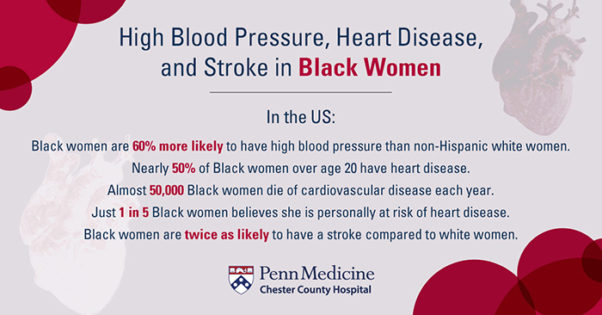Chester County Hospital: Why Are Black Women More Likely to Have High Blood Pressure Than White Women?


Black women are no strangers to health inequities. From being more likely to be diagnosed with later-stage breast cancer to experiencing more pregnancy-related deaths to having higher rates of diabetes, health-related racial disparities are impossible to ignore.
Unfortunately, these inequalities don’t stop there.
In the United States, Black women are also more likely to have high blood pressure — a condition that refers to when the force of blood that flows throughout your blood vessels is too high. If left untreated, high blood pressure can lead to a number of health problems, including heart disease and stroke.
Fortunately, there are ways to manage your blood pressure, regardless of your race. Here’s what you should know about Black women and high blood pressure — and what everyone can do to stay healthy.
Why are Black Women More Prone to High Blood Pressure?
Often referred to as “the silent killer,” high blood pressure is very common in the U.S. While nearly half of all American adults have it, Black Americans bear a greater burden from this disease. More than 40 percent of non-Hispanic Black people in the U.S. have high blood pressure, and they often develop it earlier in life compared to other ethnicities.
Because there are a number of causes of high blood pressure, the reason for this inequity is not completely clear. However, certain risk factors tend to be more prevalent in the Black community, including:

- diabetes
- obesity
- smoking
- physical inactivity
- family history
Researchers also believe there may be a gene that makes Black people more sensitive to the impacts of salt, increasing the risk of high blood pressure. This gene can make as little as one gram of salt — or half a teaspoon — raise blood pressure by as much as five millimeters of mercury (mm Hg).
Finally, high blood pressure has been connected to high levels of chronic (or ongoing) stress — something that Black women may experience more of compared to other races. Due to ongoing social unrest and systemic racism, Black women may undergo excess stress, putting them at a greater risk of developing high blood pressure.
“No matter the reason, the fact remains that high blood pressure is a dangerous, often unnoticed condition — especially among Black women. Many people who consider themselves to be completely healthy may still have undiagnosed high blood pressure, putting them at risk of heart disease and stroke,” said Dr. Sharayne Mark Coffin, cardiologist at Chester County Hospital. “I recommend at least an annual blood pressure screening in a doctor’s office and routine screening at home in this high-risk population.”
Your Defense Against High Blood Pressure: Knowledge, Prevention, and Management
Understanding that Black women have a higher risk of developing high blood pressure is a crucial first step — but it’s also just the beginning. Taking action to prevent and manage it is what will keep your heart strong and healthy for years to come.
Even though there are not often obvious symptoms, there is one sure-fire way to find out if you have high blood pressure — get tested by your healthcare provider.
Understanding Blood Pressure Readings
Your blood pressure is measured with two numbers:
- Systolic blood pressure (the top number), which measures the pressure in arteries when your heart beats
- Diastolic blood pressure (the bottom number), which measures the pressure in arteries when your heart rests
Normal blood pressure is below 120/80 mm Hg. If your blood pressure is over 130/80 mm Hg, that’s considered high blood pressure.
Blood pressure that falls between 120 to 129 systolic but less than 80 mm Hg diastolic is considered elevated blood pressure. Unless you take steps to control it, people with elevated blood pressure usually go on to develop high blood pressure.
If you’re diagnosed with either elevated or high blood pressure, you and your provider will work together to develop a treatment plan. This may include monitoring your blood pressure at home, taking medication, and making lifestyle changes like limiting your salt intake, quitting smoking, eating healthy, and exercising regularly.
If you aren’t diagnosed with high blood pressure, that doesn’t mean you’re in the clear. You still need to remain on top of your heart health — especially if you are more prone to developing high blood pressure.
Ways to lead a heart-healthy lifestyle include:
- Eat a diet that’s low in salt and full of fruits, vegetables, whole grains, and low-fat dairy.
- Limit alcohol consumption to one drink a day for women and two drinks a day for men. (Read about what is actually considered one standard drink.)
- Get active on a regular basis (at least 150 minutes of moderate-intensity physical activity, such as brisk walking, and at least two muscle-strengthening activities each week).
- Reduce stress and manage it in a healthy way when it does occur, such as with exercise or talking with a friend or family member (as long as they aren’t one of the causes of your stress).
- Don’t smoke.
Regardless of race, taking care of your heart is one of the most important jobs you have. Black women, however, must be extra diligent in preventing and managing high blood pressure.
Your heart works hard every day to provide your body with essential oxygen-rich blood. In return, show it some love by understanding your personal risk for high blood pressure and making healthy decisions that your heart is sure to appreciate.
Do you have questions about how to prevent or manage high blood pressure? Request an appointment at Penn Heart and Vascular at Chester County Hospital to learn more about caring for your heart.
Click here to read more about women’s heart health and taking care of your heart.
Connect With Your Community
Subscribe to stay informed!
"*" indicates required fields




























![95000-1023_ACJ_BannerAd[1]](https://vista.today/wp-content/uploads/2023/03/95000-1023_ACJ_BannerAd1.jpg)



















